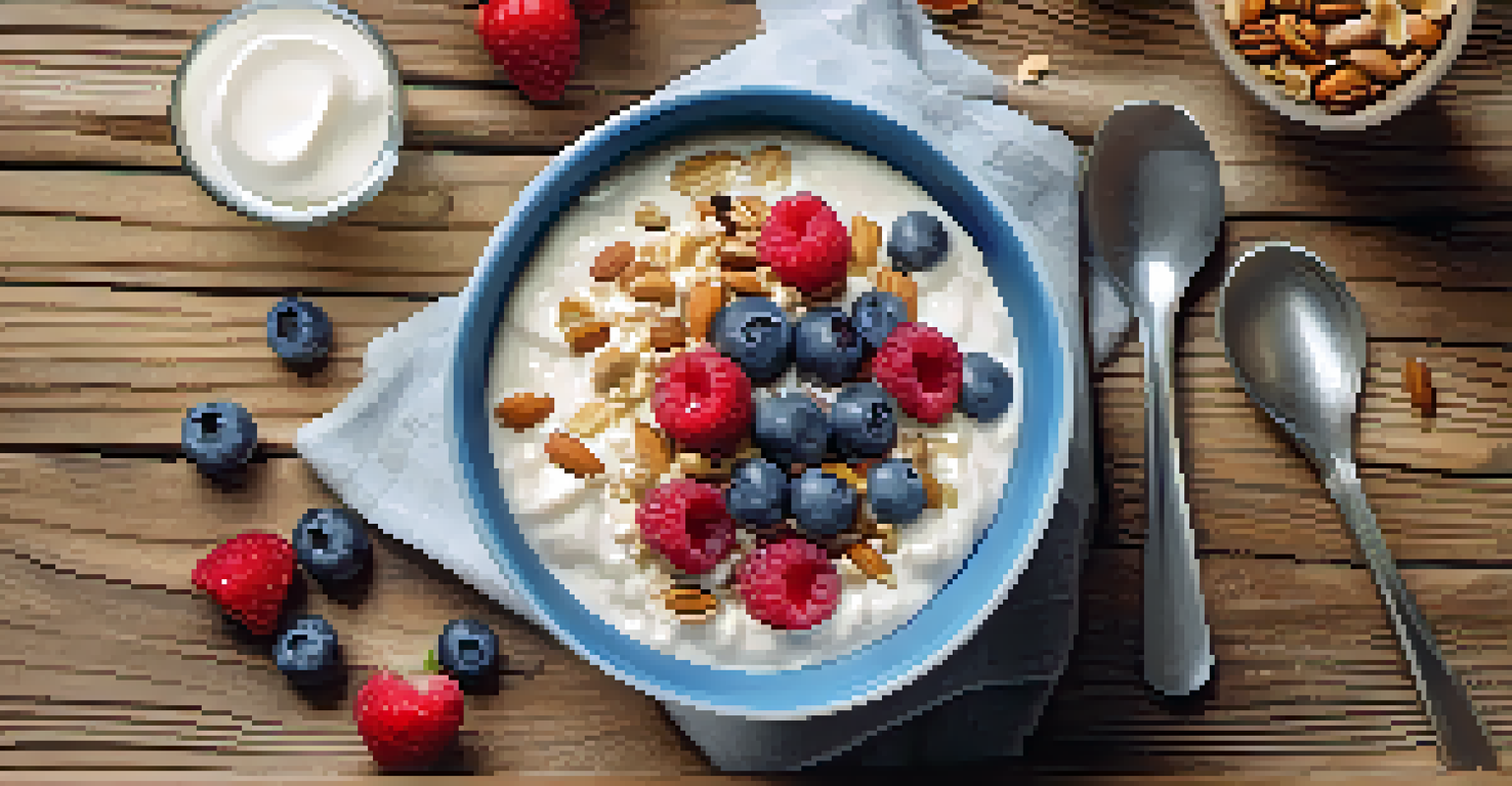Whey Protein: The Essential Supplement for Bodybuilders

What is Whey Protein and Why is it Important?
Whey protein is a high-quality protein derived from milk during cheese production. It's packed with essential amino acids that help in muscle recovery and growth, making it a staple for bodybuilders. The importance of protein in a fitness regimen cannot be overstated; it serves as the building blocks for muscle. Without sufficient protein, your body struggles to recover from intense workouts, which can hinder progress.
Strength does not come from physical capacity. It comes from an indomitable will.
This supplement is particularly beneficial because it is quickly absorbed by the body, allowing for immediate muscle repair after workouts. Imagine your muscles as a sponge that needs constant replenishing; whey protein helps keep that sponge full. Plus, its versatility makes it easy to incorporate into your diet, whether in shakes, smoothies, or even baked goods.
In a world where convenience is key, whey protein stands out as a quick and effective option for meeting your protein needs. For bodybuilders, this means less time worrying about meal prep and more time focusing on pushing limits in the gym. Whether you're a seasoned athlete or just starting out, understanding the role of whey protein is crucial for achieving your fitness goals.
Benefits of Whey Protein for Bodybuilders
Whey protein offers an array of benefits that can significantly enhance a bodybuilder's performance. Firstly, it aids in muscle recovery after strenuous workouts, reducing soreness and fatigue. This means you can hit the gym more frequently and with greater intensity, ultimately leading to better results.

Moreover, whey protein supports muscle growth through its rich content of branched-chain amino acids (BCAAs). These are essential for stimulating muscle protein synthesis, which is the process your body uses to build new muscle. Think of it as giving your muscles the fuel they need to grow stronger and more defined after every workout.
Whey Protein Aids Muscle Recovery
Whey protein helps reduce soreness and fatigue, allowing bodybuilders to train more frequently and effectively.
Additionally, incorporating whey protein into your diet can help with weight management. It promotes a feeling of fullness, which can reduce snacking and help you stay on track with your nutrition goals. For bodybuilders aiming to shed fat while maintaining muscle mass, this makes whey protein a valuable ally.
How to Incorporate Whey Protein into Your Diet
Incorporating whey protein into your daily routine is easier than you might think. One of the most common methods is through protein shakes, which can be enjoyed before or after workouts. Simply mix whey protein powder with water, milk, or a dairy alternative, and you have a convenient, nutrient-packed drink.
The only bad workout is the one that didn’t happen.
You can also get creative by adding whey protein to smoothies, oatmeal, or yogurt for an extra protein boost. This not only enhances the nutritional profile of your meals but also adds a creamy texture that many find appealing. Think of it as a secret ingredient that takes your usual breakfast to the next level.
If you enjoy baking, consider incorporating whey protein into your recipes for pancakes, muffins, or protein bars. This way, you can satisfy your sweet tooth while still meeting your protein needs. The versatility of whey protein means you can enjoy it in various forms, making it a seamless addition to any diet.
Choosing the Right Whey Protein Supplement
Not all whey protein supplements are created equal, so it's important to choose one that aligns with your fitness goals. Look for products labeled as 'whey protein isolate' or 'whey protein hydrolysate' for higher protein content and lower fat and carbohydrates. These options are typically more refined and easier for your body to absorb.
Additionally, consider the ingredients list. Avoid products that contain excessive artificial sweeteners, fillers, or preservatives. A clean, simple ingredient list often indicates a higher-quality supplement that will be more beneficial for your body. Think of it like choosing fresh ingredients for a meal; quality matters.
Supports Muscle Growth and Fat Loss
Rich in branched-chain amino acids, whey protein stimulates muscle protein synthesis while promoting a feeling of fullness for better weight management.
Lastly, personal preferences play a significant role in your choice. Whether you prefer chocolate, vanilla, or something more adventurous, there's a flavor out there for everyone. Sampling different brands and flavors can help you find the one that not only meets your nutritional needs but also tastes great.
Common Myths Surrounding Whey Protein
Despite its popularity, there are several myths about whey protein that can be misleading. One common misconception is that whey protein is only for serious bodybuilders or athletes. In reality, anyone looking to increase their protein intake can benefit from it, regardless of their fitness level.
Another myth is that consuming whey protein will automatically lead to weight gain. While it's true that excess calories can lead to weight gain, whey protein alone won't cause this effect. When used as part of a balanced diet, it can help you achieve your fitness goals without unwanted weight gain.
Lastly, some people believe that whey protein is harmful to the kidneys. For healthy individuals, moderate protein consumption, including whey protein, is generally safe and won't harm kidney function. It's always a good idea to consult with a healthcare professional if you have specific concerns, but for most, whey protein can be a beneficial supplement.
How Much Whey Protein Should You Take?
Determining the right amount of whey protein to consume can be tricky, as it varies based on individual goals, body weight, and activity level. A general guideline is to aim for about 1.2 to 2.2 grams of protein per kilogram of body weight for those engaged in regular intense workouts. This means that if you weigh 70 kg, you might aim for between 84 to 154 grams of protein each day.
It's important to remember that whey protein should complement a balanced diet, not replace whole food sources of protein. Think of it as a helpful addition rather than the main course. Whole foods like chicken, fish, eggs, and legumes should still play a vital role in your nutrition.
Easy to Incorporate into Diet
Whey protein can be consumed in shakes, added to meals, or used in baking, making it a versatile option for boosting protein intake.
To make things easier, consider tracking your protein intake using an app or a food diary. This can help you understand how much protein you're getting from both whole foods and supplements, ensuring you're on the right track to meet your goals.
Conclusion: Elevate Your Fitness with Whey Protein
In conclusion, whey protein can be a game-changer for bodybuilders and fitness enthusiasts alike. Its numerous benefits, including muscle recovery, growth support, and weight management, make it a valuable supplement in any fitness journey. By understanding how to incorporate it properly into your diet and dispelling common myths, you're well on your way to maximizing your results.
Whether you're just starting your fitness journey or looking to break through a plateau, whey protein offers the support you need to reach your goals. Remember, it’s not just about the numbers on the scale or lifting heavier weights; it's about feeling stronger and healthier overall.

So, if you haven't already, consider adding whey protein to your arsenal of fitness tools. With the right approach and mindset, you can elevate your workouts and enjoy the process of becoming the best version of yourself.